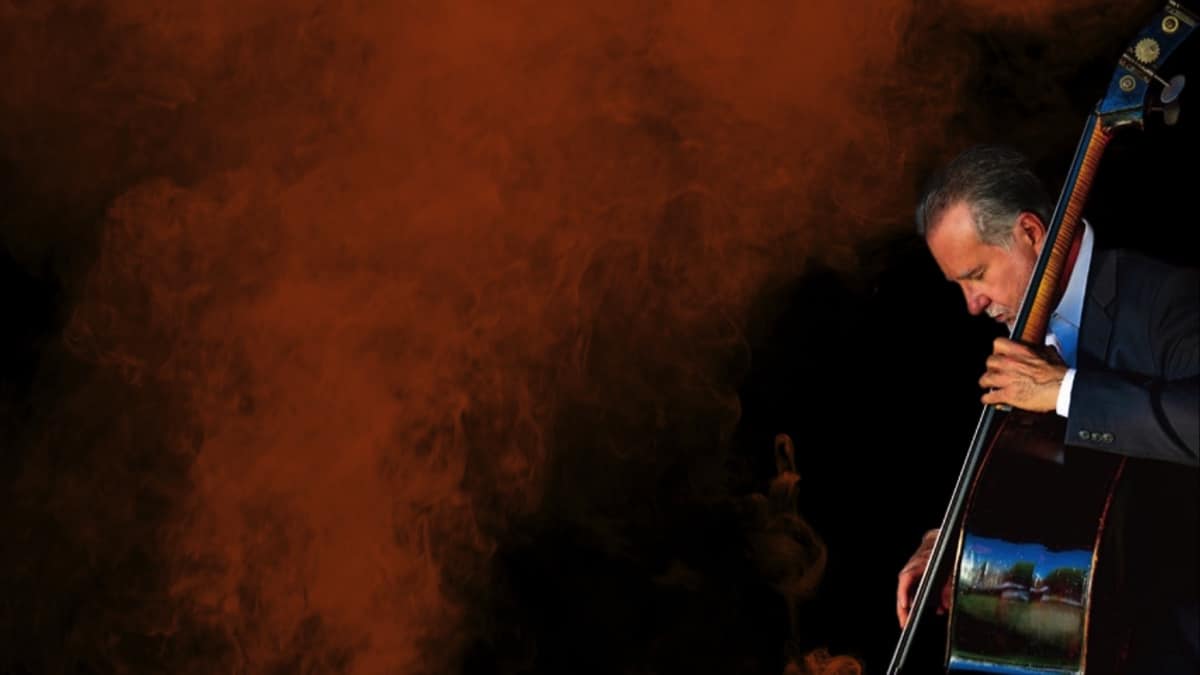Cover
Michel ‘Labex’ Labaki: The Stapping Innovator by Raul Amador: Bass Musician Magazine July 2013

Music, the universal language, is full of the richness and diversity of the people and cultures it represents. I often marvel how limited our exposure to world-music is, as we are subject to our local markets and media preferences. That said, I am thrilled and honored to bring to the forefront, our cover interview with Lebanese bassist Michel “Labex” Labaki. Labex has performed with over fifty international artists and has excelled at not only keeping the groove going but also doing so with unique, lyrical style.
I had the opportunity to meet Michel at Winter NAMM 2013 at the Gruv Gear booth and greatly enjoyed the richness and diversity of his bass playing. Michel is constantly developing new techniques and has been working on one in particular that he calls “Stapping,” which he is introducing in this issue of Bass Musician Magazine.
[RA] Please tell us a bit about your background, and how you got started as a bassist. [MLL] As a child growing up, I had the immense influence of music from my mother who is a great pianist. At the age of three, she bought me a small percussion set and I couldn’t get my hands off of it. Of course my mom always tells me today that as a kid, I always used to dance, whether there was music playing or whether someone was tampering on something or tapping a beat on a table nearby! By the age of 15, I had picked up the guitar quite well, and I was very aware of a variety of genres of music including funk, blues, jazz but especially rock.
At the time, I considered myself a rock player more than anything else. It was then that I got the opportunity to be in a band, but the catch was that they needed a bass player. I took the chance, and it was then I realized that the range of the bass guitar was the sound that I liked. It was the sound that mesmerized my senses and fulfilled the task of transforming my feelings and emotions into notes and grooves. By the age of 17, I was one of the youngest top musicians to be on a television show. People never ceased to be amazed at how a musician coming from a pure oriental background could produce such a fusion of occidental and oriental music. An occidental style is what I aimed for; listening and mimicking world renowned bassists, but because the thread of an oriental background was in my blood, it created the sound that I still make today.
There was nothing or no one that could stop me! I used to run away, ditch classes and make up lame excuses in school just to go practice bass. I slacked off to the extent that my teachers figured that the only way I would pass was to bring my bass with me to class! This is where I got the inspiration for the video clip of track 9, named “The Drill” on my first album, “Bass Lab”.
[RA] Who were your musical influences growing up? How does this differ today? [MLL] While growing up, my musical influences changed as I diverted from genre to genre in music. As a teenager, I was influenced mostly by the rock scene with bassists such as Steve Harris, Billy Sheehan and Cliff Burton. When I evolved from the rock scene to the technical world, I devoted most of my attention to the legend Jaco Pastorius. He took me to a whole new level as I learned that the bass guitar can be a solo instrument that can produce melodic sounds rather than typical rhythms and bass lines. It was at this point that I realized that the bass was indeed capable of translating the music that was in my head into reality. Without a doubt then came the influences of Stanley Clarke, Marcus Miller and of course Victor Wooten. In the end, it’s all a sequence. All of these influenced me and guided me on the path towards finding my unique sound.
[RA] What are the ‘roots’ of the traditional music of Lebanon? [MLL] The majority of the roots of traditional music come from Egypt and Lebanon. Some of the biggest icons of oriental music are Wadih El Safi, Fairuz and Tony Hanna. I was extremely fortunate and privileged to have gotten the chance to play with them as a session musician on bass and double bass. These opportunities embellished my feel of occidental and oriental music together. In addition, I have to mention the musical genius, Ziad Rahbani, who took the traditional oriental music of Lebanon and transformed it into oriental jazz.
[RA] Every culture tends to use unique time signatures that make their music recognizable and unique… what are the time signatures for the music from your country? [MLL] Time signatures that are unique in Lebanon vary depending on the type of music. Many of the commercial songs are composed in the typical 4/4 and 6/8 time signatures. However, the old cultural traditional music is composed in significant time signatures. “Tarab” & “Mowashahat” are written in other types of rhythms called “Some’eh” in 10/8 , and the very unique classics called “Dawr Hindeh” and “Aksak” are written in 7/8 and 9/8.
Moreover, besides the distinctive time signatures that make Lebanese music recognizable and unique, there is the concept of quarter-tones. Like occidental music, the concept of half-tones of note frequencies (sharps and flats) in musical theory also exists in oriental music. However, in addition to these half tones, there are also quarter tones. For example, between the notes C and D, there is the half step C#/Db. In oriental music, there is also the addition of the quarter tone between C and C#/Db, and another additional quarter tone between C#/Db and D. This is what gives Lebanese music the oriental touch that it has.
[RA] How has this music influenced you personally and professionally? [MLL] I was never really influenced professionally by oriental music because it didn’t mean a lot to me and at the same time, it didn’t really move me. However, because I grew up in an oriental background, this music influenced me personally but indirectly. Every person that grows up in a certain culture becomes habitually influenced by it. So since it’s in my blood, I was able to use it in a way that pushed my feel and fit it uniquely in a mix with my occidental style. Nevertheless, it wasn’t easy whatsoever as a bass player to fuse these two cultures together, but after years of playing and obtaining experience, I finally developed the sound and identity that I was trying to make.
[RA] Many artists aim for their ‘personal’ sound… How would you describe yours? [MLL] As an artist, I always wanted a sound that had clarity and definition, but I never really thought about it at any certain point in time. Every time I picked up my bass, I unconsciously used to switch to the bridge pickup, turn down the low and open the mid/mid-lows to get a more dynamic sound when I played finger funk. Over time, I stuck to this sound so I can play chords and tap fast licks in a Jaco Pastorius manner. This is the sound that allowed me to easily translate my emotions, thoughts and feelings into notes and techniques. When looking at basses, I always used to stay away from humbucker pickups, and moved towards single coil pickups to reach the sound that I strived for. In my “Bass Lab” album, the general sound as a whole is occidental with a touch of oriental. I achieved this sound by including two main pure oriental instruments, the ‘kanoun’ , the ‘nai’ (oriental flute), and the ‘baglama’ as an additional , as well as oriental percussion in most of the tracks like track 10 for example, “White Baglama:”
This added taste to the album while preserving my identity of producing fusion world music with funky groovy bass lines.

- 40hz Kanoun – It was a rainy Friday, I was on my way to the studio, and there was a melody that kept playing in my head. I reached the studio, strapped on my bass and played the arpeggio. Hastily I called up the Kanoun player to come record with me. My aim with this track was pure simplicity with just a loop in the background. In just that night, I had the track fully recorded in preparation for mixing.
- Do You Mind Victor – I was at my students place and he had just showed me a video for Victor Wooten – “The Workshop.” I was extremely inspired by one of the lines he played, so I manipulated the line and changed it by adding a touch of my identity in it; hence the name of the track, “Do You Mind Victor?”
- The Drill – The drill is based on the story of me running away from school in order to practice bass!
- Picky Notes – This track is named after my girlfriend, whose name is Picky Abboud. Whenever I’m with her, I’m always inspired. She’s one of the biggest inspirations in my life, and that’s why I’ve even decided to name my second album “Picky Fingers.”
- Million Miles – After an incredible gig in Lebanon, I met Fred Clarke and we jammed for a while. We clicked immediately. The blend of his insane licks along with my bass lines was so surreal to me that I had to ask him if he would record a song with me. Even though he only had two days left in Lebanon, he came to my studio the next day and we completed the song recording in one day.
- Encuentro – I recorded this song with guitarist and vocalist José Fernández. It had been a while since I hadn’t caught up with him, and it was a pure coincidence that I bumped into him during the time period that I was recording my album. There wasn’t any word better than ‘encuentro’ for the track title since it means ‘meeting’ in Spanish.
- Vaya Maria – My childhood friend Aleph was expecting a baby with his wife Dia. She was 8 months into her pregnancy when he came up with the passionate tune of the song. So taken by the joy of having his first child, he named the song after his daughter to be…Vaya.
[RA] Tell us about the “Stap” Technique you have developed. What influenced you to develop it? [MLL] I’ve always had a dilemma in my head of which instrument I can get the most out of. I played drums, moved to guitar and then ended up on bass. Even today, I have this mere sickness of buying and collecting rare guitars and assembling my own custom drum kits. There was always a controversy between these instruments. Being the nutty musician I am, I had to invent a way to combine ‘drumming on the bass’, tapping on the guitar, and slapping on the bass. After a lot of tampering, improvement and innovation, I came up with a one-of-a-kind technique. When I finally gained enough confidence to use it more in my playing and performances, I started getting a lot of questions from fellow musicians, especially in clinics. They’d come up to me and ask, “What are you playing?” Every time someone asked me, I’d answer by explaining my concept. After getting overwhelmed with this same question every time I played, I decided to save my breath by combining all three into one by throwing out the name, “Stap!” I will feature this technique in recordings for the first time in my upcoming second album as I am still improving on it. But for now you can get a sneak peak of the “Stap” in the video:
[RA] Coming from Beirut, share with readers what the music industry is like in your part of the world. How has it changed since you first started in the industry? [MLL] Ever since thousands of years, Lebanon has always acted as a bridge between orient and occidental countries. In the past ten years, the music scene in Lebanon has been booming till now. In the 90’s, when internet was introduced and there became a worldwide web connection, this allowed Lebanese people to connect with different cultures abroad musically creating the same bridge that connected orient and occidental countries in the past. This allowed the new generation of musicians to give and take, and even mix. Lebanon is now considered one of the most countries that is open to occidental music in the Middle East, and there are many rising local bands that are killing the music scene locally and abroad. Bands such as, ‘Near Surface’, ‘Blend’, ‘The Wanton Bishops’, ‘Wheeping Willows’, ‘Mashrou’ Leila’, ‘Arthur Satyan’, etc… are producing albums and even touring in Europe and the United States. Furthermore, there are plenty of production companies that are investing in these young talents and people so the future of the music industry in Lebanon is looking prosperous.
[RA] Tell us about MTV Lebanon. [MLL] MTV Lebanon is one of the leading independent media stations in Lebanon and the Middle East. The show “Heik Menghanni” is a primetime television show that is watched by many. It has really challenged my skills in terms of both performance and showmanship. The show is really significant in the sense that per each episode, we have to perform 60-70 different short songs. This creates competition for us, 8ème Art, as a band, because the guests that appear on the show not only sing oriental songs, but they also sing occidental songs.
[RA] What were some of your greatest professional and learning experiences with the numerous artists you have worked with? [MLL] At the age of 19, I was asked to be a session musician in studios, album recordings and live concerts for Warner Brothers and their artists. These artists were international artists from different countries including Cuban, Spanish, Greek, Turkish, Gypsy and even American projects such as: Demis Roussos, HAIR, Aleph, Tino Favazza, Son Cubano, El Chato, José Fernández, Luna Blanca (musician from The Gypsy Kings), Isabelle Roche, Wadih El Safi, Oriental Roots Orchestra, and Selim Sesler.

From a tonal standpoint, the use of Korina as a body wood paired with an Ebony fingerboard gives a sound that is exceptional. The Korina that was used for it was harvested in the late 1950’s and has been in the Fodera workshop since the late 1980’s — making it extremely dry, stable and resonant. In the electronics department, it is employed with an active EMG P-PUP in the neck position and a passive Lindy Fralin lateral humbucking J-PUP in the Bridge position with the addition of a buffer board to the pre-amp made by Mike Pope. Hence, the tone is well-rounded, articulate and powerful. There’s plenty of growl on the bridge PUP and lots of rich, deep low-end from the neck PUP. Playability wise, the neck was carved to be “thin and fast” to allow for some blazingly fast solo runs with the use of an extra deep lower cutaway for complete access to all twenty-four frets.
[RA] Any upcoming projects? [MLL] I have two main upcoming projects. First, I’ll be going on tour in the Middle East and Europe for the Labex project and 8ème Art (screen legends). Second, as I mentioned before, I’m working on my new album “Picky Fingers,” in assistance with recording/mixing audio engineers, Sam Sidawi from Amsterdam and Riad Hajjar from Lebanon, produced by 8eart as well. The album is going to feature international musicians such as the Kurzweil pianist and Gruv Gear artist Dennis Guevara, composer and guitar player Tony Khalife, Dutch drummer Florian Hoefnagels, DW drummer Ralph Choueiri. I’ll leave the rest of the artists a surprise! In addition, I’m also working on producing a video clip with José Fernández for the fourth song on my first album, ‘Encuentro’, and my bass clinics will start in July throughout the Middle East. I’m also preparing for the upcoming NAMM show in 2014 where I’m hoping to have my second album release and hopefully I’ll see you there!
[RA] And finally, as an artist, what do you wish you knew 10 years ago that you know now? [MLL] Everything I didn’t know ten years ago made me what I am today.
Visit online:
Credits:
- Photographer: Fares Sokhon
- Videographer: Pulse Productions
- Personal assistant: Ryan Idriss
- Management : www.8eart.com
Bass Videos
Brian Bromberg, Paying Tribute to Scott LaFaro, April 2024

Brian Bromberg, Paying Tribute to Scott LaFaro, April 2024…

Brian Bromberg is one heavy-hitting bass player and I am in awe of his talent as one of the few individuals who is equally proficient on electric and upright bass.
You might remember our conversation back in 2018 when he released his powerhouse Funk album. Brian’s “A Little Driving Music” album is a staple on all our road trips and his Jaco and Jimi Hendrix tribute albums are mind-blowing… and I could go on and on.
Now, Brian has taken on the arduous task of producing an album paying tribute to the late, great, Scott LaFaro. He teamed up with pianist Tom Zink and drummer Charles Ruggiero and Brian delivers a commanding performance on upright. The entire album is a masterpiece and a real treat to listen to track after track.
Join us as Brian shares the details behind this project and more.
Photo, Michel Bocandé
Featured Videos
Visit Online
brianbromberg.net
FB @BrianBrombergBassist
YouTube
Cover
Leland Sklar, Over Half a Century of Bass, March 2024

We all have enjoyed Leland Sklar’s Bass lines for over half a century.

You might remember that we had him on our cover back in 2017 and did an update when he launched his book “Everybody Loves Me” in 2020. It was exciting to hear that The Immediate Family had got back together in the studio to work on their own music in 2019 and are now up to two albums.
Just last December, Magnolia Pictures released a documentary titled “Immediate Family” where we got a behind-the-scenes look at the massive contributions Danny Kortchmar, Waddy Wachtel, Ross Kunckle, Leland Sklar and Steve Postell have made in countless songs that are the very essence of our daily personal musical soundtracks. Seeing the astronomical roster of performers they have supported over many years is very eye-opening. It is a must-see for any music lover!
Now, I am thrilled to bring you a special chat with Leland Sklar where we go more in-depth into the bass side of his musical journey.
Photos: Header, Rob Shanahan – Cover Photo, Jay Gilbert/Chris Schmitt
Featured Videos:
Skin In the Game – https://www.youtube.com/watch?v=QhbnzIrdjJ8
from new album Skin In The Game
The Toughest Girl In Town – https://www.youtube.com/watch?v=UVQLZIRfLjU
from new album Skin In The Game
Fair Warning – https://www.youtube.com/watch?v=1DN18DYwLsU –
from the self-titled album The Immediate Family
Visit Online
www.immediatefamilyband.com/
www.facebook.com/TheImmedFamily
www.instagram.com/theimmedfamily/
Bass Videos
Ricky Phillips, STYX Bass And More – February 2024

Ricky Phillips, STYX Bass And More…

I have always been a huge Styx fan. Their music kept me awake during countless nights studying and gave my imagination a place to escape when I had a moment to take a break.
I had the immense opportunity to chat with STYX bassist Ricky Phillips for our August Cover in 2017 and follow his projects as time passed. Now, I am thrilled to have the opportunity to catch up with Ricky as he has been super-busy over the past six years.
Join me as we take a deep dive into the band’s most recent album “Crash the Crown” and EP “The Same Stardust”. Ricky shares some insights into the herculean team effort behind the scenes and the musical process that keeps them ever so busy and how he has updated his sound.
Without further ado… Here is Ricky Phillips!
Photo: Jason Powell
Featured Videos:
“Crash of the Crown” lyric video
“Reveries” lyric video
“Save Us From Ourselves” lyric video
“Sound the Alarm” lyric video
“Too Much Time On My Hands” Zoom video 2020
Visit online:
www.Styxworld.com
FB & IG @styxtheband
Bass Videos
Jeff Pilson, Foreigner Low End – January 2024

Jeff Pilson, Foreigner Low End – January 2024…

Those of us who were around back in the 70’s remember how certain songs on the radio resonated with us. It turns out that many of these iconic melodies came from Foreigner and they were part of our personal soundtracks!
After all these years, the band is going as strong as ever with Jeff Pilson firing away on bass midstream into a 2-year farewell tour.
I am excited to be able to bring you all the details about Jeff’s musical Journey, the farewell tour in progress, how he gets his sound and his plans for the future.
Cover Photo: Krishta Abruzziini / Video Photos: Krishta Abruzzini, Karsten Staiger, Gina Hyams
Featured Videos
For more news on FOREIGNER and upcoming Farewell Tour dates, fans can visit:
foreigneronline.com
facebook.com/Foreigner
twitter.com/ForeignerMusic
instagram.com/foreignerlive
youtube.com/user/FWebTeam
Also on FB @officialjeffpilson
Bass Videos
Rodney O’Quinn, Rockin’ Hard Through the Years – December 2023

Interview With Foghat Bassist Rodney O’Quinn…

Many rock fans have enjoyed music by Foghat, who originally formed in London back in 1971.
Over the many decades of playing, the band members have changed, leaving behind only Roger Earl as the only original member. Bassist Rodney O’Quinn left the Pat Travers Band and joined the group in 2015 and has been laying down the low end for this iconic quartet keeping the Foghat legacy alive. With a new album titled “Sonic Mojo” which dropped on November 10th, the band is as busy as ever and there is lots of very tasty music to come.
Join me as we learn of Rodney O’Quinn’s musical journey, how he gets his sound, and his plans for the future.
Photos:
Cover, Jake Coughlin
Video Thumbnail, Tom Apathy
Photos used in the video: Kerry Quinn, Chuck Lanza, Kim Granger, Kenneth Strohm, Jake Coughlin, Jay Jylika
Featured Videos:
1st Single from Sonic Mojo – Official “Drivin’ On”
2nd Single from Sonic Mojo – “She’s a Little Bit of Everything Official Video
“Road Fever”- California Mid State Fair – Paso Robles, CA – 7-27-22
“Stone Blue” – Rodney O’Quinn Bass/Lead Vocals – Don Odell’s Legends – Woonsocket, R.I – 10/15/22 – The Stadium Theater
The Earl’s Court – Season 2, Episode 7: Funny Guys
“I Just Want to Make Love to You” – CasinoRama – 6-9-23
FOGHAT “Somebody’s Been Sleepin’ in My Bed” – Mohegan Sun, Uncasville, CT – 1/28/22
“I Just Want to Make Love to You” – California Mid State Fair – Paso Robles, CA – 7-27-22
Visit Online:
www.foghat.com
www.facebook.com/Foghat
www.twitter.com/FOGHAT
www.instagram.com/foghat_official
www.youtube.com/user/FOGHATMUSIC












